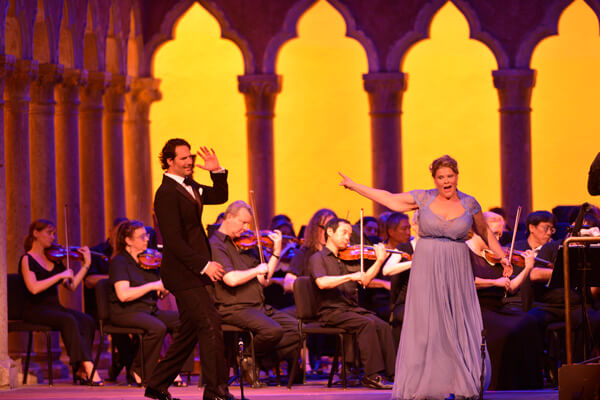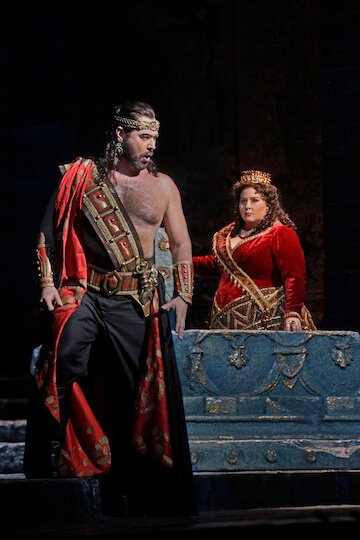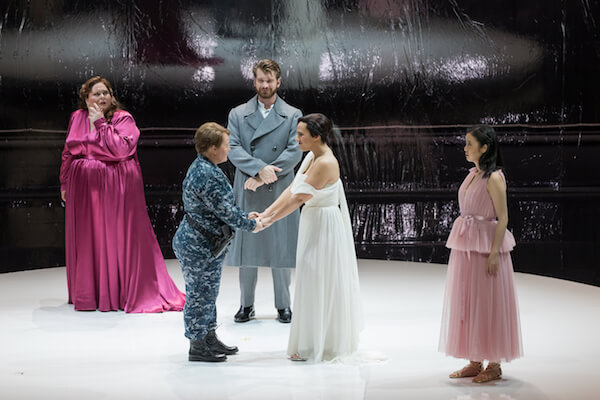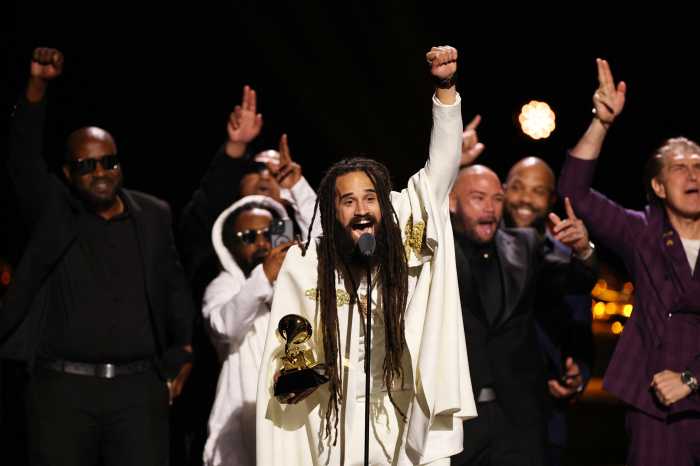James Valenti and Jennifer Check in the Caramoor performance of by Giuseppe Verdi’s “Don Carlos.” | GABE PALACIO
In the 19th century, every Italian composer wanted to write a grand opera for the Paris Opéra. A triumph in cosmopolitan Paris meant fame on an international scale. Giuseppe Verdi cautiously took up the challenge, adapting his early “I Lombardi” into the more finished “Jérusalem” (1847). In 1855, he undertook his first original five-act grand opera to a French text — “Les Vêpres Siciliennes.” A decade later, he revised his Italian “Macbeth” (1847) for Paris, creating what is now the standard performing edition. Verdi’s last and most ambitious attempt at grand opera was the 1867 “Don Carlos.”
Both “Vêpres” and “Don Carlos” have usually been performed internationally in Italian translation — the Metropolitan Opera has performed both works exclusively that way. Verdi worked on the Italian translation of “Vêpres” and found it a dispiriting experience.
“I now know what it means to translate and I feel sympathy for all the bad translations that are around because it is impossible to make a good one,” he confided to Tito Ricordi.
Will Crutchfield revives Verdi’s grand opera intentions in Vêpres,” “Don Carlos” at Caramoor
Not only were the texts purged of political, libertarian, and religious references but the octosyllabic meter of French verse was altered to conform to Italian forms. Add this to the very different accents and syllabic stresses of French versus Italian and the composer’s careful prosody and musical phrase structure are ruined.
Will Crutchfield did all lovers of Verdi and opera a service by performing “Les Vêpres Siciliennes” and “Don Carlos” in the original language as part of his “Verdi in Paris” program at the Caramoor Festival. Both presentations were revelatory.
“Les Vêpres Siciliennes” has been considered a gateway work to Verdi’s mature masterpieces like “Forza del Destino” and “Aïda,” but its grandeur, quality, and scope were fully realized in the July 6 Caramoor presentation. One could hear how the faulty standard Italian translation distorted the work. In the original French, the choruses of the French occupying army have a jaunty breezy elegance in stark contrast to the darker, brooding, shorter phrases of the oppressed Sicilian populace. In Italian, the French officers sound like a bouncy opera buffa chorus with the angry Sicilians providing a rollicking obbligato.
Crutchfield performed the score complete, including the “Four Seasons” ballet. Angela Meade has sometimes seemed a vocally gifted but interpretively remote singer — not so here. Meade’s successful recent debut in Vienna in “Vespri” has enhanced her vocal and dramatic authority. Done up in full diva regalia — long velvet gown with sheer cape, diamond tiara in her chignon, and a proud defiant mien — she confidently handled the nearly three-octave range of Duchesse Hélène’s music. She shifted seamlessly from dramatic declamation to floating high cantilena to florid virtuosity. During her brilliant last-act “Boléro,” Meade tossed the flowers of her wedding bouquet to the audience.
The tenor role of Sicilian rebel Henri is equally high and demanding but the bel canto tenor John Osborn has recently conquered the heroic role of Arnold in Rossini’s “Guillaume Tell.” His tenor is narrow and bright — sturdy rather than beautiful and his high notes hardened under pressure. Osborn’s technical security did not keep him from tiring by Act IV but he recovered nicely for his lyrical serenade in Act V.
“Vêpres” is dramatically out of character for Verdi in that the French tyrant governor Guy de Montfort becomes increasingly sympathetic as he bends his inflexible authority to win the love of Henri, his illegitimate son. Marco Nisticò traded his customary buffo manner for Gallic elegance as Montfort, his dry, rather light baritone communicating severity and humanity convincingly. Burak Bilgili fielded a huge blunt black bass instrument as the implacable Italian patriot Procida, whose nationalist agenda lent itself to terrorism with no concern for collateral damage. His raw elemental power provided a vivid dramatic contrast to his colleagues.
Crutchfield conducting the Orchestra of St. Lukes provided a brilliant mix of epic scope and intimate detail.
When Verdi reworked his massive five-act “Don Carlos” into a more streamlined, four-act version in 1884, he enlisted one of the original librettists, Camille du Locle, to provide the new texts. This revision premiered at La Scala in a decent but flawed Italian translation. When Crutchfield’s presented the dramatically symmetrical 1884 revision (no Fontainebleau act) en francais on July 20, it was immediately apparent how much better suited the French text is, including a more appropriate match of word to phrase. In Princesse Eboli’s aria “O don fatale,” the second phrase ends in a stabbing upward note. In French, the words are “heaven in its anger,” whereas in the Italian version the stabbing upward note is on the word “cielo” or “heaven.”
The Caramoor cast was game and gifted but not comparable to past greats (singing in Italian). The biggest name was veteran lyric mezzo Jennifer Larmore, stretching her resources as Eboli. Larmore’s sound is now leaner and drier in the middle, with the tone opening more at the top of the range. She easily soared into the soprano climaxes of this falcon role. If one could put aside aural echoes of the powerhouse Italianate dramatic mezzos of yesteryear, Larmore’s brighter nervier sound more easily suggested a sensual temperamental young coquette driven to desperation. Larmore’s flamboyant impersonation almost overstepped the boundaries of concert opera and her “O don fatale” brought down the house.
In recent years, the roles of Élisabeth de Valois and Rodrigue have been cast too often with overparted Mimis and Count Almavivas. Crutchfield tapped two inexplicably neglected large-voiced American singers — Jennifer Check and Stephen Powell. Both have only sung comprimario roles at the Met. Check was the Celestial Voice in last season’s Met “Don Carlo,” and here she easily outsang her erstwhile Met Elisabetta, revealing a warm, gleaming soprano of easy expansion. A rim of steel on a few high phrases suggests a voice more suited to Wagner and Strauss. Powell’s oaken baritone outshone almost all of the baritones the Met has recently presented in Verdi — the tone rock solid and rich throughout the range.
Christophoros Stamboglis’ rumbling basso profondo did not suggest the icy haughtiness of Philippe II but plumbed the monarch’s sorrow in Act III. Mikhail Svetlov’s woolly bass was more impressive for size than tonal steadiness or French style. The fly in the ointment was matinee idol tenor James Valenti as the tortured title character. Valenti’s throttled sound was constantly pushed, and the high notes were unsteady. His dramatic interpretation featured a generalized dopey hysteria that did not connect convincingly with his stage partners or vary with the action.
Crutchfield’s conducting was less persuasive than in “Vêpres.” Some of the tempos were too slow, and the big choral scenes failed to coalesce excitingly.




































